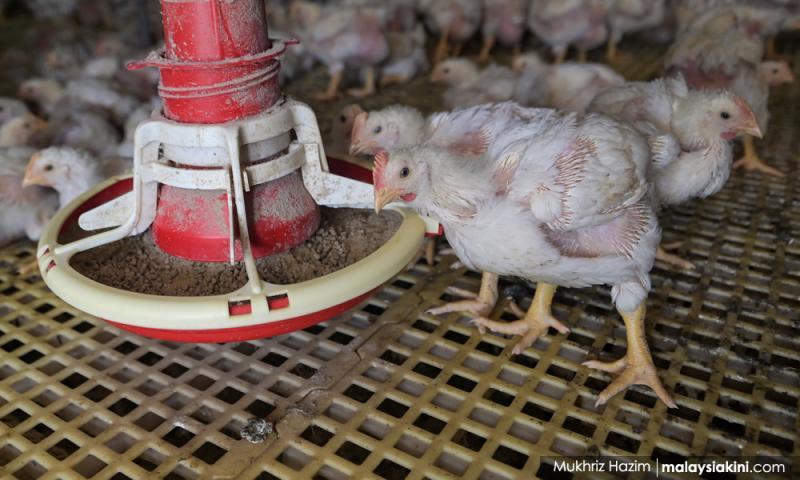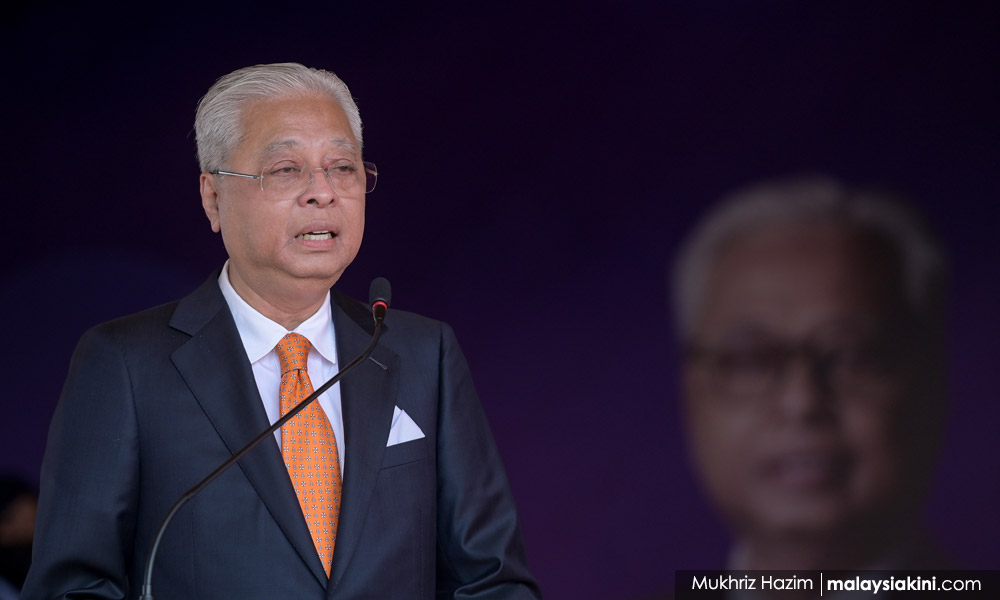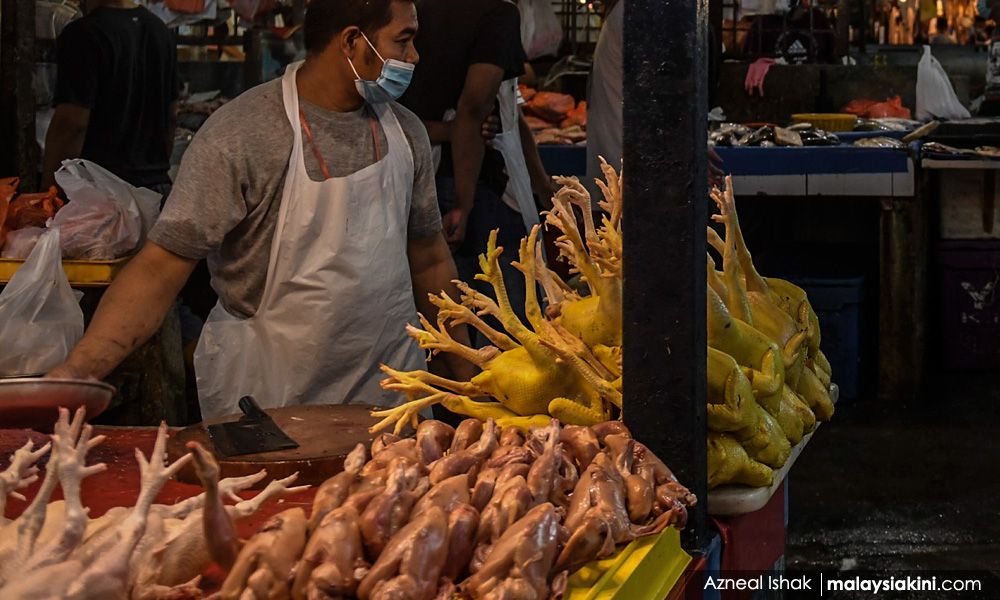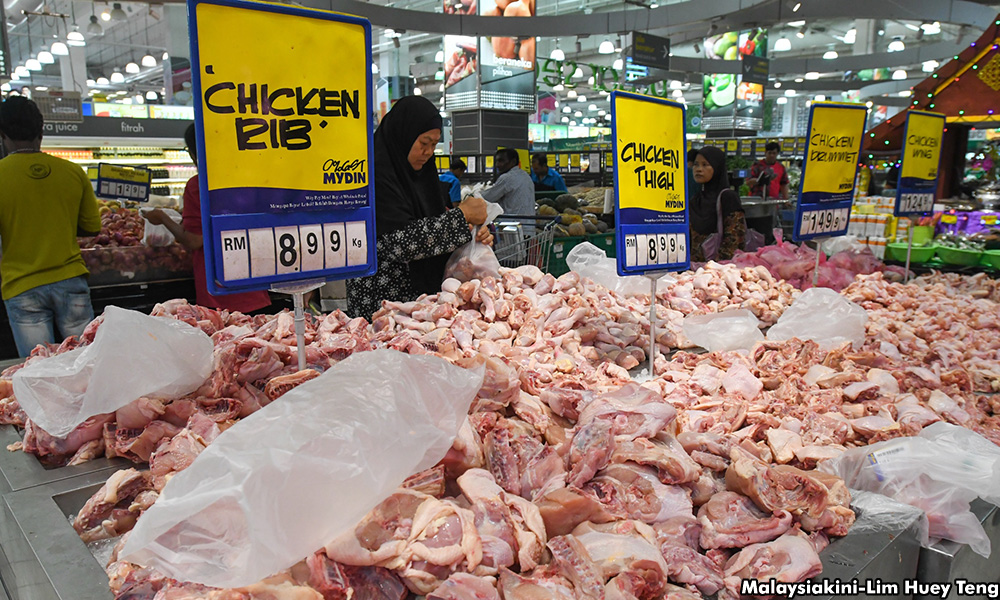
Andrew Sia
COMMENT | What is chickensh*t economics? That's when the costs of chicken farming keep shooting up but the government keeps forcing breeders to lower selling prices. Eventually, it leads to disaster.
This has been going on for over one year in the poultry industry, and now some farms are closing shop. The root problem is that the cost of chicken feed is no longer, as they say, “chicken feed”. Mafi, the Ministry of Agriculture and Food Industries, itself revealed that prices of imported grain feed (which is 70 percent of farming costs) have tripled from RM500 to RM1,900 per tonne in some cases. The weakening ringgit and Ukraine crisis have only worsened this inflation.
Yet, the ceiling price for chickens set by the Skim Harga Maksimum Keluarga Malaysia, (SHMKM) has been steadily reduced from RM9.50/kg during Deepavali 2021 to RM9.30 (December 2021), further to RM9.10 (January 2022) and then to RM8.90 (February to June 2022). This is obviously unsustainable. Does the government expect farmers to keep suffering losses? Even the Mydin boss has said that the ceiling price should be raised to RM9.90.
Keluarga Malaysia may be a good slogan to win votes but it has been steadily strangling chicken farmers, who apparently don’t belong to this loving “Malaysian Family”. Is it because most large-scale farmers don’t belong to the right political party? Or community?
Mafi admitted way back in September last year that the answer to keeping chicken prices low was for the government to subsidise farmers. Agriculture and Food Industries Minister Ronald Kiandee said then, “Industry players need to be protected, the people (consumers) need to be protected as well.”
COMMENT | What is chickensh*t economics? That's when the costs of chicken farming keep shooting up but the government keeps forcing breeders to lower selling prices. Eventually, it leads to disaster.
This has been going on for over one year in the poultry industry, and now some farms are closing shop. The root problem is that the cost of chicken feed is no longer, as they say, “chicken feed”. Mafi, the Ministry of Agriculture and Food Industries, itself revealed that prices of imported grain feed (which is 70 percent of farming costs) have tripled from RM500 to RM1,900 per tonne in some cases. The weakening ringgit and Ukraine crisis have only worsened this inflation.
Yet, the ceiling price for chickens set by the Skim Harga Maksimum Keluarga Malaysia, (SHMKM) has been steadily reduced from RM9.50/kg during Deepavali 2021 to RM9.30 (December 2021), further to RM9.10 (January 2022) and then to RM8.90 (February to June 2022). This is obviously unsustainable. Does the government expect farmers to keep suffering losses? Even the Mydin boss has said that the ceiling price should be raised to RM9.90.
Keluarga Malaysia may be a good slogan to win votes but it has been steadily strangling chicken farmers, who apparently don’t belong to this loving “Malaysian Family”. Is it because most large-scale farmers don’t belong to the right political party? Or community?
Mafi admitted way back in September last year that the answer to keeping chicken prices low was for the government to subsidise farmers. Agriculture and Food Industries Minister Ronald Kiandee said then, “Industry players need to be protected, the people (consumers) need to be protected as well.”

Prime Minister Ismail Sabri Yaakob
Nothing was done for months until Jan 31 this year. That’s when Prime Minister Ismail Sabri Yaacob announced that the grand-sounding National Action Council on Cost of Living (NACCOL) had decided subsidies for chicken farmers would be given out.
Subsidies delayed
Okay, great, but where’s the beef? I mean, the money? That depends on who you believe.
Several poultry companies were reported to have suspended operations over the May 21-22 weekend to “protest” the government’s delay in providing the subsidies. Yup, a chicken strike.
Others downplayed this and said, no la, it’s not a protest, just that our birds are “still too small” to sell due to the “hot weather”. Okay, whatever. Either way, shortages of chickens were reported in various places.
Yet RM729 million in subsidies had been supposedly set aside for farmers to stabilise chicken prices since February. What happened? Did the money "sangkut" or "get stuck" somewhere? On May 19, Ismail said that “certain procedures” had resulted in late payments and he wanted this to be “looked into”.
But on May 23, he changed his tune and blasted big companies, claiming they had rejected the subsidies and only “small farmers” had accepted them. This, he added, was "regrettable and disappointing" and had “greatly inconvenienced the people”.
In other words, he blamed the big farmers for the whole fiasco.
Really? This is the first time that I’ve heard of businessmen refusing free money! Or was Ismail playing the politician, trying to divert the people’s anger from the government’s own inefficiency over, as he mentioned four days earlier, “certain procedures”?
Perhaps a more accurate explanation came from Mafi which admitted that so far, only RM50 million in subsidies had been paid out from the total of RM729 million. Thus, the ministry pledged to send out “more officers to the states” to speed up the payments to boost chicken production. In other words, they kinda confessed that they had been knuckleheads in implementing the subsidies decided by NACCOL.
Nothing was done for months until Jan 31 this year. That’s when Prime Minister Ismail Sabri Yaacob announced that the grand-sounding National Action Council on Cost of Living (NACCOL) had decided subsidies for chicken farmers would be given out.
Subsidies delayed
Okay, great, but where’s the beef? I mean, the money? That depends on who you believe.
Several poultry companies were reported to have suspended operations over the May 21-22 weekend to “protest” the government’s delay in providing the subsidies. Yup, a chicken strike.
Others downplayed this and said, no la, it’s not a protest, just that our birds are “still too small” to sell due to the “hot weather”. Okay, whatever. Either way, shortages of chickens were reported in various places.
Yet RM729 million in subsidies had been supposedly set aside for farmers to stabilise chicken prices since February. What happened? Did the money "sangkut" or "get stuck" somewhere? On May 19, Ismail said that “certain procedures” had resulted in late payments and he wanted this to be “looked into”.
But on May 23, he changed his tune and blasted big companies, claiming they had rejected the subsidies and only “small farmers” had accepted them. This, he added, was "regrettable and disappointing" and had “greatly inconvenienced the people”.
In other words, he blamed the big farmers for the whole fiasco.
Really? This is the first time that I’ve heard of businessmen refusing free money! Or was Ismail playing the politician, trying to divert the people’s anger from the government’s own inefficiency over, as he mentioned four days earlier, “certain procedures”?
Perhaps a more accurate explanation came from Mafi which admitted that so far, only RM50 million in subsidies had been paid out from the total of RM729 million. Thus, the ministry pledged to send out “more officers to the states” to speed up the payments to boost chicken production. In other words, they kinda confessed that they had been knuckleheads in implementing the subsidies decided by NACCOL.

So the chicken strike worked! Well, not really. Ismail showed them who was boss by totally banning the export of chickens, starting June 1. Will that strangle the industry further?
Cutting farmers off from valuable foreign exchange that can cross-subsidise the supply of cheap chickens locally? And cause other countries to doubt the reliability of Malaysia’s supply contracts? Ismail also wants to import more chicken from overseas, thus further pressing local producers.
All this is a crying shame because poultry is the one area where Malaysia is self-sufficient in meat supply (98 percent). In contrast, we are forced to import 52 percent of our cuttlefish or sotong, 78 percent of our beef and 90 percent of our mutton. Strangling our most successful meat industry is like killing the chicken that laid the golden egg.
Holy war?
More ominously, Ismail warned that the government is probing possible chicken price cartels. And he promised a “jihad” or “holy war” against middlemen which had “all this while manipulated supply and prices”.
Sorry for asking, but when a “jihad” is declared, is it usually against the enemies of a certain religion? So I guess those folks are no longer welcome in Keluarga Malaysia?
This attack is all the more stunning because it’s a reversal of what he said in November 2021, that “traders and wholesalers are not responsible” for the hike in essential goods prices. Instead, it was due to accumulated costs in the supply chain.
“I see it as resulting from the supply chain. Take chicken as an example. Breeders, factories and wholesalers all have their own costs,” he said then. So why the U-turn now?
If “cartels” exist, I certainly don’t wish to defend them. In fact, the government should have cracked down ages ago. Why wait till now to go after them? Surely such cartels, if any, must have existed for years? Or are they a convenient bogeyman, tinted with religious overtones, only after the chickensh*t has hit the fan (with the farm closures)?

In other words, is Ismail’s attack on “middlemen” and alleged “cartels” a political ploy to distract from his government’s failure to holistically manage the long-brewing problems of food prices and production?
Part of this holistic response is to produce chicken feed locally (and cheaply). In April, Mafi announced that 80,000ha nationwide will be used to plant grain corn by 2023. This is a much-belated implementation of the Grain Corn Development Masterplan, which was launched by the government way back in 2016.
Will it work? DAP secretary-general Anthony Loke said, "We have vast land for agriculture. The problem is, the coordination between the federal government and the state governments has a lot of bureaucracy.”
“Bureaucracy” is a soft way to describe it. Activist Mariam Mokhtar alleges that some state governments have taken away land from those who want to do farming, for example, the pomelo growers and vegetable farmers of Perak. This is probably why, despite being blessed with fertile land plus abundant rain and sunshine, Malaysia still has to import 86 percent of its mangoes.
I have nothing personal against Ismail Sabri. But this is not the first time that he has failed at managing things, be it his signature Mara Digital Mall, the devastating floods last December or the incompetent/confusing MCOs that caused spiralling Covid cases/deaths and huge economic losses.
All the Keluarga Malaysia branding in the world (paid for with taxpayers’ money with its shameless self-given 90 percent score) and grandiose "national action councils", can no longer make up for poor performances.
We need more capable leaders such as Rafidah Aziz who can talk to all the stakeholders and then come out with a practical strategy to manage our chicken production and agriculture. Because food is far too important a matter to be left to the chickens*t economics of blundering politicians.
KINIGUIDE | Chicken shortage and food insecurity - what's behind it?
ANDREW SIA is a veteran journalist who likes teh tarik khau kurang manis. You are welcome to give him ideas to brew at tehtarik@gmail.com.

Managing a country on the basis of Race and Religion is a recipe for disaster.
ReplyDeleteIf we cannot even resolve a simple problem of supply of chicken with reasonable pricing, what more can we hope for from this ketuanan government?
DeleteSingapore had already planned for food security with its 30/30 goal ie producing 30% of its needs by 2030 (commendable given its size) and Malaysia with much fertile land, imports quite a good amount of its food requirements!
We should plan for at least 60 to 70% overall self sufficiency and 100% for certain items. But no, this imbecilic government is interested in jihad and play the blame game.
The Perak state government acquired some farm land that was cultivated by farmers without licence (but which they tried to obtain without success) to distribute to its victorious footballers. What happened to those land? Did the footballers continue farming or did they sell away what they received?